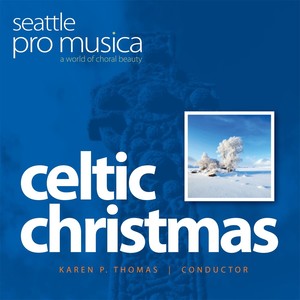
Celtic Christmas
- 流派:Classical 古典
- 语种:英语
- 发行时间:2013-12-02
- 类型:录音室专辑
- 歌曲
- 时长
简介
Recorded live in concert at Bastyr Chapel, Celtic Christmas features the lively sounds of traditional Celtic choral music for the Christmas season, as well as new music by composers from Ireland, Wales and Scotland. New works include the evocative Christus vincit by James MacMillan, C.V. Stanford's stunning Magnificat for Double Choir, and a new setting of A spotless rose by Paul Mealor. Jerusalem, a traditional Irish melody, is probably the best-known piece performed by the group Anúna, consisting of waves of sound punctuated by female soloists. The heterophonic setting features a lead soloist, with the melody freely layered by other voices, creating overlapping waves of sound. Gwyneth Walker is a former faculty member of the Oberlin College Conservatory, and now works as a full-time composer. Walker's catalog includes over 130 commissioned works for orchestra, band, chorus and chamber ensembles. The Christ-child’s Lullaby is based on the traditional Gaelic song Tàladh Chrìosda. James MacMillan was born in Ayrshire, Scotland, in 1959. He studied music at the University of Edinburgh and completed doctoral studies in composition at the University of Durham. Returning to Scotland in 1988, he began to identify more with his national and religious roots, sometimes incorporating Scottish folk elements or Scottish historical themes into his music. In the past decade MacMillan’s popularity has risen steadily, making him one of the most influential Scottish composers of his generation. Sir Charles Villiers Stanford was born in Dublin in 1852, and brought up in a cultured professional circle. He taught at Cambridge and at the Royal College of Music in London, and was conductor of the London Bach Choir. Along with Elgar and Parry, he was responsible for the late-19th century ‘renaissance’ in British music, achieving special stature as a composer of sacred choral music. The Magnificat for Double Chorus is a masterpiece of the genre, and Stanford’s only Latin setting of a text he set numerous times in English for liturgical use. This exuberant and masterfully-crafted work was written near the end of Stanford’s life, and dedicated to his friend and rival, Parry (with whom he had a stormy relationship, and who died before the Magnificat was completed). The score bears the inscription “Because death has prevented me from handing this work to the living Charles Hubert Hastings Parry, I dedicate it to his name in grief.” Suo Gân is a well-known Welsh lullaby, which first appeared in print circa 1800. Many listeners may recognize the melody, which featured prominently in the film “Empire of the Sun”. Jeffrey Jones-Ragona has arranged, recorded, and performed dozens traditional Celtic songs. Ble rwyt t’in mynd is a traditional “Wren-Boy’s Song” – the day after Christmas, St. Stephen’s Day, was also called the Day of the Wren. The young men and boys of Welsh villages would go to the woods and capture a wren, put it in a cage or on a long pole, and carry it about from house to house. The householders would offer the Wren-Boys money for the annual Wren Dance – although it was not unheard of for the Wren-Boys to retire to the nearest pub and drink up their profits. The Wren-Boys existed throughout the British Isles, and the symbolism of the song grew out of the old pagan custom of hunting the wren. In many legends, the wren, known as the “King of the Birds,” is pictured as a tyrant and the killing of the wren was associated with peasant rebellion. Mouth music is a form of singing in Celtic countries, often used to accompany dance. It originated in Scotland and Northern Ireland when the traditional cultures were suppressed, and the playing of traditional music on instruments was banned. Mouth music, also called lilting, diddling or port-a-beul (a tune from the mouth), developed as a vocal form of imitating the sounds of instruments, especially for dance tunes. The tune on this recording, called Mouth Music, is from the Hebrides, and is a transcription of a version sung by the contemporary Irish musicians Dolores Keane and John Faulkner. Seattle composer John Muehleisen’s Invocation is from his celebratory Christmas cycle, This Night, which was commissioned and premiered by the Dale Warland Singers in 2003. The text is drawn from the voluminous Carmina Gadelica, an anthology of ancient Celtic Christian texts gathered by English tax collector and amateur ethnographer Alexander Carmichael while he carried out his governmental duties in the Scottish Highlands. Described in the New York Times as, “one of the most important composers to have emerged in Welsh choral music since William Mathias… A real and original talent”, Paul Mealor’s music has rapidly entered the repertoire of choirs and singers around the world. Mealor was catapulted to international attention when 2.5 billion people (the largest audience in broadcasting history) heard his Ubi caritas performed by the choirs of Westminster Abbey and Her Majesty’s Chapel Royal at the Royal Wedding Ceremony of His Royal Highness Prince William and Catherine Middleton at Westminster Abbey in April 2011. A spotless Rose is from his choral cycle on rose texts, Now Sleeps the Crimson Petal, and makes use of the imagery of a rose opening. William Mathias is regarded as one of the most significant Welsh composers of the 20th century and one of the few to establish an international reputation. Educated at the University College of Wales, Aberystwyth, and in London at the Royal Academy of Music, he was professor of music at the University College of North Wales, and artistic director of the North Wales Festival. The hallmarks of his style are rhythmic propulsion and lyrical warmth, expressed in a tonally rooted but chromatically flexible language. Program notes by Karen P. Thomas.

